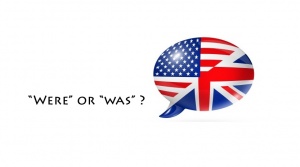Difference between revisions of "Language/English/Grammar/Was-and-Were"
Jump to navigation
Jump to search
m (Quick edit) |
|||
| (14 intermediate revisions by 3 users not shown) | |||
| Line 1: | Line 1: | ||
Was and were are both past tenses of the verb TO BE. | [[File:Were-or-Was.jpg|thumb]] | ||
<span style="font-size:300%;">When use "Was" and when use "Were" in English?</span> | |||
'''Was''' and '''were''' are both past tenses of the verb TO BE. | |||
It's important to know how to use it. It's an irregular verb used a lot in both written and spoken English. | |||
==Singular / Plural== | ==Singular / Plural== | ||
| Line 6: | Line 12: | ||
*Were is used in the second person singular and plural (you, your, yours) and first and third person plural (we, they). | *Were is used in the second person singular and plural (you, your, yours) and first and third person plural (we, they). | ||
Example: | Example: | ||
- They '''were''' <del>was</del> gone (plural) | |||
- He '''was''' <del>were</del> gone (singular) | |||
== | ==If I were== | ||
Example: If I '''were''' <del>was</del> a better teacher, I could have more students. | Example: "If I '''were''' <del>was</del> a better teacher, I could have more students." | ||
Although '''I''' is singular, you have to use "If I '''were'''" with the subjunctive mood. This subjunctive is a verb form that is used for hypothetical statements. | |||
You often use this form to express wishes. | You often use this form to express wishes. | ||
| Line 19: | Line 27: | ||
*He wishes I weren't so selfish. | *He wishes I weren't so selfish. | ||
*He wishes it were wet outside. | *He wishes it were wet outside. | ||
==Other Lessons== | |||
* [[Language/English/Grammar/Mass-noun|Mass noun]] | |||
* [[Language/English/Grammar/Miscellaneous-collocations|Miscellaneous collocations]] | |||
* [[Language/English/Grammar/Linking-with-And-But-So|Linking with And But So]] | |||
* [[Language/English/Grammar/How-Some-pointers-when-using-Adjectives|How Some pointers when using Adjectives]] | |||
* [[Language/English/Grammar/Adjectives-ending-in-ly|Adjectives ending in ly]] | |||
* [[Language/English/Grammar/Subject-Verb-Agreement|Subject Verb Agreement]] | |||
* [[Language/English/Grammar/In:-place|In: place]] | |||
* [[Language/English/Grammar/CONJUNCTIONS-→-Cause-and-Effect|CONJUNCTIONS → Cause and Effect]] | |||
* [[Language/English/Grammar/Abstract-nouns-and-concrete-nouns|Abstract nouns and concrete nouns]] | |||
* [[Language/English/Grammar/Actual-and-actually|Actual and actually]] | |||
<span links></span> | |||
Latest revision as of 12:23, 25 March 2023
When use "Was" and when use "Were" in English?
Was and were are both past tenses of the verb TO BE.
It's important to know how to use it. It's an irregular verb used a lot in both written and spoken English.
Singular / Plural[edit | edit source]
- Was is used in the first person singular and the third person singular (he, she, it).
- Were is used in the second person singular and plural (you, your, yours) and first and third person plural (we, they).
Example: - They werewasgone (plural) - He wasweregone (singular)
If I were[edit | edit source]
Example: "If I werewasa better teacher, I could have more students."
Although I is singular, you have to use "If I were" with the subjunctive mood. This subjunctive is a verb form that is used for hypothetical statements.
You often use this form to express wishes.
For example,
- He wishes I weren't so selfish.
- He wishes it were wet outside.
Other Lessons[edit | edit source]
- Mass noun
- Miscellaneous collocations
- Linking with And But So
- How Some pointers when using Adjectives
- Adjectives ending in ly
- Subject Verb Agreement
- In: place
- CONJUNCTIONS → Cause and Effect
- Abstract nouns and concrete nouns
- Actual and actually
